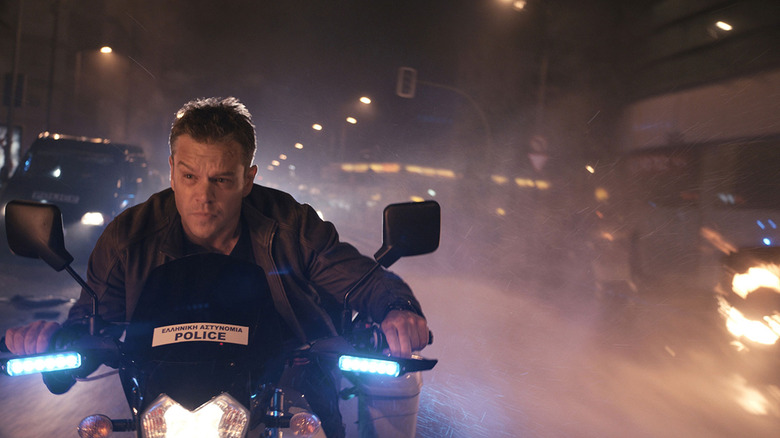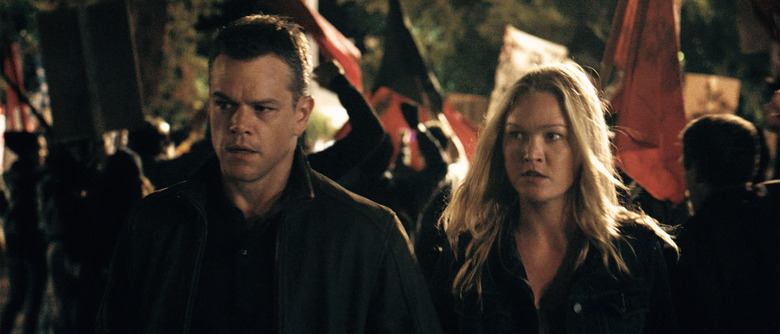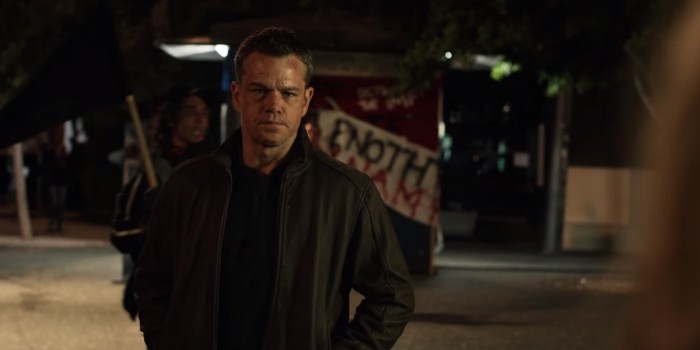'Jason Bourne' Spoiler Review: Extreme Ways Are Back Again And Oh Boy, Are They Looking Tired
Jason Bourne is a heartbreaking movie. In a summer filled with sequels that have let audiences down, in a year where so many franchise films have failed to justify their existences beyond the margins of an accountant's logs, Paul Greengrass and Matt Damon were supposed to return to this series and remind everyone of how it's done.Jason Bourne is fine. It's no disaster. It's no debacle. Individual scenes and performances work. However, in its best moments, all it serves to do is remind you of just how good the original three movies were and how this one can't quite capture that same energy. Instead, it falls back on familiarity and cliche, which is the most tragic thing you can say about a series that reinvented the espionage thriller well over a decade ago.
Bourne Again
The biggest obstacle facing Jason Bourne from the moment the title appears on the screen is that it needs to justify its existence. The Bourne Ultimatum, released nearly ten years ago, did a fine job of wrapping up every question that mattered in the complex conspiracy surrounding Bourne, Treadstone, and his lost past. Bourne was still on the run when the credits rolled (because he'll always be on the run), but the book was closed – the mission statement laid out by The Bourne Identity had been fulfilled, and it had been fulfilled well, and watching Bourne swim to safety after leaping off the roof of a hospital while "Extreme Ways" blasted on the soundtrack was as satisfying as denouements can get.
So Jason Bourne is instantly in a tricky position: it has to invent a reason to bring Bourne back into action. It has to find something not only compelling enough to drag Bourne out of hiding, but compelling enough to make a return to his world feel necessary. And this is the first and most obvious stumble that the film makes, because Bourne's return to the world of bone-breaking international espionage is fueled by information that feels silly and contrived and out of step for a series that has otherwise had a knack for building a compelling mystery and giving its (intentional) cypher of a main character something to pursue and fight for.
And because the details behind Bourne's return (more on that in just a moment) are so flimsy and contrived, the film's re-enactment of familiar beats and ideas begins to grate. This is the fourth Matt Damon-starring Bourne movie to feature a third-act scene where he corners the mastermind villain, always played by a respectable older actor, holds a gun to his body and demands answers. This is the third Matt-Damon-starring Bourne movie to climax with a wildly destructive car chase through a major city. You've seen every scene in this movie before, especially the ones where Bourne is hiding out in an apartment, gets a message from a secret ally that he has two minutes to escape, and proceeds to elude capture by stepping into traffic while the villains in the CIA control room all stare at each other and wonder where he went.
It needs to be said that these scenes are well-filmed by director Paul Greengrass and his crew and if all you want is more Matt Damon breaking bones and walking through crowds like a ghost so he can snatch an unsuspecting contact away from the agents who are supposed to be tracking him, Jason Bourne delivers on that front. It's more of the same. But we're on the fifth Bourne movie (if you choose to count the long-forgotten The Bourne Legacy) and that same bag of tricks is starting to look a little worn.
Who Is Jason Bourne at This Point?
The ongoing beauty of the James Bond movies is that Agent 007 never changes, but the movies around him always do. The world's most famous cinematic secret agent will always be cut from familiar cloth no matter how many times the actor swaps out, but the tone of his adventures, the story beats, the aesthetic details, and whether or not anyone is allowed to crack a smile is determined by the era in which the movie is made. Bond is unchanging, but his world is not. That's the key to his longevity.
I thought a lot of about James Bond while watching Jason Bourne for two reasons. First of all, Bond's personality, as familiar as it is to most everyone at this point, is at least a personality. It's a set of characteristics that can be broken down and described. Bourne, on the other hand, is just a vehicle for steely-eyed mayhem. To be fair, Matt Damon is very good at delivering that steely-eyed mayhem and now that his face is showing some age and his hair is going gray, he finally looks like the hardened and weary Clint Eastwood-type he seemed destined to become in the original trilogy. But after four adventures, it's become clear that Bourne doesn't change or evolve. He learns things about his past, but this new information never changes his actual course in life or the decisions he makes. And that could be okay, because until the Daniel Craig era, James Bond didn't change or evolve either. However, if you combine this unchanging robot with a film that retreats to the same well one too many times, the seams start to show. You start to realize that Bourne is a walking puzzle and we've already solved this puzzle. Now he's just a portrait that we've been staring at for way too long.
The second reason I thought about James Bond while watching Jason Bourne is because this movie stumbles into the same trap that engulfed Spectre last year. This time around, it's not enough for Bourne to be just a spy in search of his identity. It's not enough that his enemy is a series of dark institutions that don't mean well for the world or the citizens of the United States. It has to become needlessly and awkwardly personal. The big reveal at the end of The Bourne Ultimatum was that David Webb, the man who would become Jason Bourne, volunteered for the Treadstone program and willingly gave up his life and identity to become an assassin. It was a hard-hitting moment – after searching for someone to blame for turning him into a killer for three movies, Bourne could only blame himself in the end.
Jason Bourne muddies those waters in the worst way possible. It's revealed that David Webb's father founded Treadstone and that the program ultimately decided that his soldier son would be an ideal candidate. When Daddy Webb balked and threatened to expose their work, he was murdered by a car bomb, and his son was told that a terrorist was behind the job. So David Webb joined Treadstone to avenge his father, a reveal that transforms a morally murky revelation into something profoundly familiar and Hollywood. It's not enough that Bourne is just a guy who is good at what he does and gets caught up in something bigger and more dangerous than expected. Like with Spectre, which felt compelled to make Bond's arch-nemesis Blofeld into his adoptive brother for some reason, Jason Bourne embraces coincidence and cheap theatrics. It makes the hero into the pawn in a ridiculous series of events rather than a man who made his own decisions and must live with them. Jason Bourne is still a man of few words, a man defined by action, but now he's been rebuilt on a foundation of cliches.
The Modern World
The Bourne series has always been good at working its action set pieces and plot points into the fabric of the international landscape, touching on events and concepts and fears that are relevant to audiences at that given point. This shouldn't come as a surprise to anyone who has seen director Paul Greengrass' other movies – United 93, Bloody Sunday, Captain Phillips, and Green Zone are often political and frequently journalistic. Greengrass' chaotic and immersive style works for staging action and chases, but it's generally even better when he's allowed to work his interest in real-world events into the background.
The best sequence in Jason Bourne arrives early, with Bourne and frequent ally Nicky Parsons fleeing government killers through a Greek austerity protest that quickly devolves into a riot. It's a terrifying backdrop for a motorcycle chase, with both Bourne and his adversaries forced to navigate police roadblocks and rioters armed with Molotov cocktails. Greengrass' handheld camera and unpredictable editing places you smack-dab in the middle of a nightmare. There's an immediacy to this sequence that is lacking elsewhere in the movie, evidence that Greengrass is more interested in the political turmoil of Greece than in whatever Bourne and his enemies are doing elsewhere. For fifteen minutes or so, Jason Bourne comes alive.
Other attempts to work reality into the film aren't quite as successful. It's not the fault of the incredibly talented Riz Ahmed that the film never makes his social media CEO (and CIA crony) remotely convincing and it's genuinely hilarious how the film cuts away whenever anyone even suggests that they're going to explain what his company really does. Social media is a buzzword. Government surveillance is a buzzword. The film expects us to fill in the blanks and that's not fair. Even less convincing is the film's Julian Assange analogue, who is presented as a silly Eurotrash schemer who tries to kill Bourne with a barbell.
In Search of a Worthy Adversary
The Bourne series has seen its fair share of strong villains, although David Strathairn's Noah Vosen rises to the top of the pack. Like most Bourne villains, he probably didn't look like much on the page (a committed and icy bureaucrat who justifies everything he does in the name of America's security), but Strathairn radiates intelligence and menace. He's a no-nonsense boss, a stickler for rules and policy, who just so happens to be following a dark agenda.
Jason Bourne needs a villain of his caliber. On the "How Many Fucks Does Tommy Lee Jones Give This Time" scale, Tommy Lee Jones is giving about a 4.5 as CIA director Robert Dewey, the latest in a long line of mysterious men who pop out of nowhere and reveal themselves to be a key factor in Bourne's past. Jones' performance is sleepy at best, lacking the simmering rage of Strathairn, the skeevy self-interest of Brian Cox, or the desperate panic of Chris Cooper. The disinterest goes beyond Jones' performance, as Dewey himself is the most straightforward mustache-twirler this series has featured so far. He's such an obvious bad guy who hits all of the obvious bad guy notes and if he wasn't played by a recognizable actor, he would dissipate into a puff of transparent steam in every one of his scenes.
Even less successful is Vincent Cassel's "the Asset," the latest in the long line of henchmen Bourne has fought over the years. Like previous heavies played by Clive Owen, Karl Urban, and Edgar Ramirez, the Asset is a physically imposing man of few words and Cassel is an interesting enough screen presence to embody a genuine threat. He has one of the most interesting faces in cinema and in Jason Bourne, his large eyes feel like windows into a soulless abyss. Unlike the other henchmen Bourne has battled, though, the Asset is given a backstory. It seems that Bourne's actions in Ultimatum got him captured and tortured, so he wants revenge! It's getting personal! But wait! Jason Bourne also learns that the Asset is the one who killed his father! It's getting doubly personal! It's a preposterous series of revelations that demands that we swallow not one, but two spy movie cliches. It feels desperate, like Greengrass and co-writer Christopher Rouse realized that Bourne's storyline had been sewn up completely in Ultimatum and had to inject a mission of double-sided personal vengeance into a series where institutions, not individuals, have always been the enemy. The Bourne series used to defy expectations. Here, it embraces the second oldest cliche in the action movie playbook.
For the record, the oldest click in the action movie playbook is a character being suddenly killed the moment before they're going to reveal something important. Jason Bourne pulls this particular stunt twice.
Looking to the Future
Jason Bourne ends with the seeds already planted for another entry in the series. Bourne has once again proven how much smarter he is than his adversaries and he walks into the distance while "Extreme Ways" plays again. I'd be lying if I said I didn't grin when I heard those familiar opening notes. I'd be lying if I said I didn't get a quick thrill out of watching Bourne outsmart everyone once again in those closing moments. But as the credits rolled, I realized the truth: I didn't want another Jason Bourne movie.
Heck, I especially didn't want another Jason Bourne movie if Alicia Vikander's Heather Lee was going to be the chief antagonist going forward. She may be a strong actor, an Academy Award winner, and one of the most promising performs in cinema at the moment, but Vikander is a wet blanket in this movie and her American accent a crime against accents. Jason Bourne one-upping her isn't nearly as satisfying as him telling Joan Allen to get some rest, mainly because Allen gave us a reason to be invested in her Pam Landy as both an adversary and potential ally.
Universal has not been shy about wanting Damon and Greengrass to make more Bourne movies and the strong opening weekend for Jason Bourne suggests that another one may be in the pipeline sooner rather than later. That's why any future Bourne movies need to be reinventions. They need to shatter the template and start over. Since Bourne is built to be unchanging, they need to surround him with strong supporting characters played by actors who can deliver. He needs to be the strong and steady force that must adapt to any given situation. Just look to The Bourne Ultimatum, the best movie of the series so far, and how it tosses Bourne and his scant allies into one unforgiving situation after another, changing the nature of the threat with each new beat and increasing and decreasing the threat to provide variety. Every time I watch Ultimatum, I feel like I'm seeing it for the first time. Every chase is fresh and every action scene told at a different pace. I've only seen Jason Bourne once, but I feel like I've seen it a dozen times before. After all, it's the kind of movie that has the gall to feature an exiled soldier working as a bare-knuckle boxer in underground fighting rings, which is the kind of silly nonsense you'd expect from a Sylvester Stallone movie, not a Bourne movie.
Jason Bourne is a hard movie to hate. The action is more of the same, but it's well-staged. Damon doesn't break any new ground with Bourne, but he's a capable strong and silent type. Although it is by far the longest Bourne movie, it never really drags. But it does just hang there as a collection of greatest hits, a movie built on reminding you of the things you enjoyed about the first three movies rather than bring something new to the table. The world has changed. It's time for Jason Bourne to change, too.




